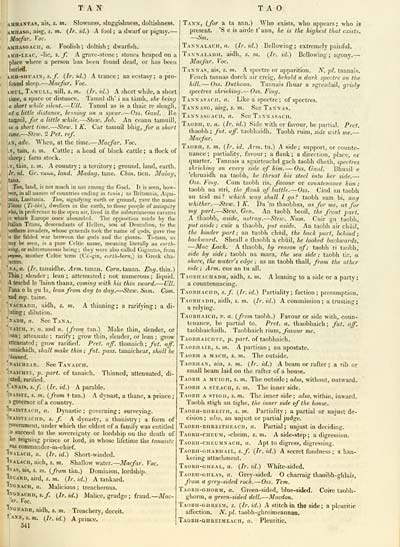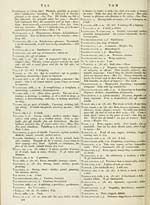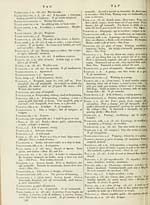Download files
Complete book:
Individual page:
Thumbnail gallery: Grid view | List view

TAN
T A O
AMHAXTAS, ais, s. m. Slowness, sluggishness, doltishness.
AMUASG, aisg, s. »!. (It. id.) A fool ; a dwarf or pigmy. —
Macfar. Voc.
amhasgacii, a. Foolish ; doltish ; dwarfish.
iMH-LEAC, -lie, s. f. A grave-stone ; stones heaped on a
place where a person has been found dead, or has been
buried.
iMH-SHUAix, 5. /. (Ir. id.) A trance ; an ecstasy ; a pro-
found sleep. — Macfar. Voc.
iMUL, Tami'll, uill, s. 7«. (Ir. id.) A short while, a short
lime, a space or distance. Tamiil dh' i na tànih, she being
a short while silent. — Ull. Tamul as is a thaic re sleagh,
at a little distance, Icminc/ on a spear. — Oss. Gaul. Re
taqjuil, for a little white. — Steic. Job. An ceann tamuilj,
in a short time. — Stew. 1 A'. Car tamuil bhig, for a short
time. — Steiv. 2 Pet. ref.
AX, adv. When, at the time. — Macfar. Voc.
.y, tain, s. ?h. Cattle; a head of black cattle; a flock of
sheep ; farm stock.
.X, tain, s. m. A country ; a territory ; ground, land, earth.
Ir. id. Gr. tuhx, land. Madag. tane. Chin. tien. Malay,
tana.
. Tan, land, is not much in use among the Gael. It is seen, how-
;ver, in all names of countries ending in tunia; as Britannia, Aqui-
ania, Lusitania. Tun, signifying earth or ground, gave the name
Titans {Ti-tàii), dwellers in tlie earth, to those people of antiquity
i«ho, in preference to the open air, li\ ed in the subterraneous caverns
■ n which Europe once abounded. The opjxisition made by the
Italian Titans, descendants of Hellen, son of Deucalion, to the
lorthem invaders, whose generals took tlie name of gods, gave rise
the fabled war between the gods and the giants. Ti-tans, as
nay be seen, is a pure Celtic nanie, meaning literally an eurth-
>eing, or subterraneous being ; they were also called Gigantes, from
r^ytnt, another Celtic term (Ct-gin, curih-born,) in Greek cha-
acters.
'ka, a. (/)•. tanaidhe. ylr;n. tanmi. CorH. tanan. .E?;^. thin.)
Thin ; slender ; lean ; attenuated ; not numerous ; liquid.
Ateachd le 'lainn thana, coming with his thin sword. — Ull.
Tana o la s:n la, lean from day to day. — Stew. S<im. Com.
uid sup. taine.
'xachadii, aidh, s. 7n. A thinning; a rarifying ; a di-
uting; dilution.
'xADH, a. See Tana.
'XAICH, V. a. and n. {from tan.) Make thin, slender, or
ean; attenuate; rarify; grow thin, slender, or lean ; grow
itteiiuated ; grow rariified. Pret. off. thanaich ; fut. aff.
:anaichidh, shall make thin ; fut. pass, tanaichear, shall be
'kinned.
'xAiCHEAR. See Taxaicii.
XAiciiTF, p. part, of tanaich. Thinned, attenuated, di-
uted, rarilied.
^^^XAIs, s.f. {Ir. id.) A parable.
iNAisTE, s. m. {from t tan.) A dynast, a thane, a prince ;
1 governor of a country.
iXAisTEACn, a. Dynastic; governing; surveying.
'Ì^^AISTEAC^D, s. f. A dyna.sty, a thanistry; a form of
coverament, under which tlie oldest of a family was entitled
succeed to the sovereignty or lordship on' the death of
he reigning prince or lord, in whose lifetime the tanaiste
fii commander-in-chief.
■iNALACH, a. {Ir. id.) Short-winded.
Inalach, aich, s. m. Shallow water. — Macfar. Voc.
IsAS, ais, s. w). {from tan.) Dominion, lordship.
IxcATiD, aird, s. m. {Ir. id.) A tankard.
'SGUACH, a. Malicious; treacherous.
Ihgnachd, s.f. {Ir. id.) Malice, grudge ; fraud.— il/ac-
"T. Voc.
Ingxadh, aidh, s. m. Treachery, deceit,
t Axx, s. m. {Ir. id.) A prince."
541
Taxn-, {for a ta ann.) Who exists, who appears; who is
present. 'S e is airde t' ann, he is the highest that exists.
~Sm.
Taxxalacii, n. {Ir. id.) Bellowing; extremely painful.
Taxxaladij, aidh, s. ?«. (//•. id.) Bellowing; agony. — -
Macfar. Voc.
Taxxas, ais, s. 7n. A spectre or apparition. A", p/. tannais.
Feuch tannas dorch air creig, behold a dark spectre on the
hill. — Oss. Duthona. Tannais fhuar a sgreadail, grisly
spectres shrieking. — Oss. Fing.
Taxxasacii, a. Like a spectre ; of spectres.
Taxnasg, aisg, s. m. See Taxxas.
Tax"X'asgacii, a. See Taxxasacii.
Taobii, v. a. {Ir. id.) Side with or favour, be partial. Pret.
thaobh ; fut. aff. taobhaidh. Taobh ruim, side with »«e.—
Macfar.
Taobii, s. m. {Ir. id. Arm. tu.) A side; support, or counte-
nance ; partiality, favour; a flank; a direction, place, or
quarter. Tannais a sgairteachd gach taobh dheth, spectres
shrieking on every side of him. — Oss. Gaul. Bhuail e
'chruaidh na taobh, he thrust his steel into her side.—
Oss. Fing. Cum taobh ris, favour or countenance him ;
taobh na stri, the flank of battle. — Oss. Ciod an taobh
an teid mi? which way shall I go? taobh sam bi, any
whither. — Stew. 1 A'. Da 'm thaobhsa, as for vte, as for
my part. — Stew. Gen. An taol)h beoil, the front part.
A thaobh, aside, astray. — Stew. N^um. Cuir gu taobh,
put aside ; cuir a thaobh, put aside. An taobh air chiiil,
the hinder part; an taobh chiiil, the back part, behind;
backward. Sheall e thaobh a chùil, he looked backwards.
— 3Iac Lack. A thaobii, by reason of; taobh ri taobh,
side by side ; taobh na mara, the sea side ; taobh tir, a
shore, the water's edge ; as an taobh thall, from the other
side ; Arm. eus an tu all.
Taobiiaciiadii, aidh, s. 7n. A leaning to a side or a party;
a countenancing.
Taobiiaciid, s. /. {Ir.id.) Partiality ; faction ; presumption.
Taobiiadii, aidh, s. 7«. (/;■. id.) A commission ; a trusting;
a relying.
Taobiiaicii, v. a. {from taobh.) Favour or side with, coun-
tenance, be partial to. Pret. a. thaobhaich ; fut. aff.
taobhaichidh. Taobhaich rium, favour me.
Taobiiaiciite, p. part, of taobhaich.
Taobiiaik, s. m. A partisan ; an apostate.
Taobh a macii, s. m. The outside.
Taobiiax, ain, s. m. {Ir. id.) A beam or rafter ; a rib or
small beam laid on the rafter of a house.
Taobii a .muigh, s. m. The outside; also, without, outward.
Taobh a steacii, s. in. The inner side.
Taobii a stigh, s. m. Tlic inner side; also, within, inward.
Taobh stigh an tighe, the inner side of the house.
Taobh-biiueitii, s. m. Partiality; a partial or unjust de-
cision ; also, an unjust or partial judge.
Taobh-biireitheach, a. Partial; unjust in decidins.
Taobh-ciieum, -cheim, s. m. Aside-step; a digression.
Taobh-cheumxach, a. Apt to digress, digressing.
Taobii-ghabhail, s./. {Ir.id.) A secret fondness ; a han-
kering attachment.
Taobii-gheal, a. {Ir. id.) White-sided.
Taobii-giilas, a. Grey-sided. O charraig thaoibh-ghlais,
from a grey-sided rock.^Oss. Tern.
Taobh-giiorm, a. Green-sided, blue-sided. Coire taolih-
ghorm, a green-sided dell. — Macdon.
Taobh-giikeim, s. {Ir.id.) A stitch in the side; a pleuritic
aflection. A^. pi. taobh-ghreimeannan,
Taobh-ghueimeach, a. Pleuritic.
T A O
AMHAXTAS, ais, s. m. Slowness, sluggishness, doltishness.
AMUASG, aisg, s. »!. (It. id.) A fool ; a dwarf or pigmy. —
Macfar. Voc.
amhasgacii, a. Foolish ; doltish ; dwarfish.
iMH-LEAC, -lie, s. f. A grave-stone ; stones heaped on a
place where a person has been found dead, or has been
buried.
iMH-SHUAix, 5. /. (Ir. id.) A trance ; an ecstasy ; a pro-
found sleep. — Macfar. Voc.
iMUL, Tami'll, uill, s. 7«. (Ir. id.) A short while, a short
lime, a space or distance. Tamiil dh' i na tànih, she being
a short while silent. — Ull. Tamul as is a thaic re sleagh,
at a little distance, Icminc/ on a spear. — Oss. Gaul. Re
taqjuil, for a little white. — Steic. Job. An ceann tamuilj,
in a short time. — Stew. 1 A'. Car tamuil bhig, for a short
time. — Steiv. 2 Pet. ref.
AX, adv. When, at the time. — Macfar. Voc.
.y, tain, s. ?h. Cattle; a head of black cattle; a flock of
sheep ; farm stock.
.X, tain, s. m. A country ; a territory ; ground, land, earth.
Ir. id. Gr. tuhx, land. Madag. tane. Chin. tien. Malay,
tana.
. Tan, land, is not much in use among the Gael. It is seen, how-
;ver, in all names of countries ending in tunia; as Britannia, Aqui-
ania, Lusitania. Tun, signifying earth or ground, gave the name
Titans {Ti-tàii), dwellers in tlie earth, to those people of antiquity
i«ho, in preference to the open air, li\ ed in the subterraneous caverns
■ n which Europe once abounded. The opjxisition made by the
Italian Titans, descendants of Hellen, son of Deucalion, to the
lorthem invaders, whose generals took tlie name of gods, gave rise
the fabled war between the gods and the giants. Ti-tans, as
nay be seen, is a pure Celtic nanie, meaning literally an eurth-
>eing, or subterraneous being ; they were also called Gigantes, from
r^ytnt, another Celtic term (Ct-gin, curih-born,) in Greek cha-
acters.
'ka, a. (/)•. tanaidhe. ylr;n. tanmi. CorH. tanan. .E?;^. thin.)
Thin ; slender ; lean ; attenuated ; not numerous ; liquid.
Ateachd le 'lainn thana, coming with his thin sword. — Ull.
Tana o la s:n la, lean from day to day. — Stew. S<im. Com.
uid sup. taine.
'xachadii, aidh, s. 7n. A thinning; a rarifying ; a di-
uting; dilution.
'xADH, a. See Tana.
'XAICH, V. a. and n. {from tan.) Make thin, slender, or
ean; attenuate; rarify; grow thin, slender, or lean ; grow
itteiiuated ; grow rariified. Pret. off. thanaich ; fut. aff.
:anaichidh, shall make thin ; fut. pass, tanaichear, shall be
'kinned.
'xAiCHEAR. See Taxaicii.
XAiciiTF, p. part, of tanaich. Thinned, attenuated, di-
uted, rarilied.
^^^XAIs, s.f. {Ir. id.) A parable.
iNAisTE, s. m. {from t tan.) A dynast, a thane, a prince ;
1 governor of a country.
iXAisTEACn, a. Dynastic; governing; surveying.
'Ì^^AISTEAC^D, s. f. A dyna.sty, a thanistry; a form of
coverament, under which tlie oldest of a family was entitled
succeed to the sovereignty or lordship on' the death of
he reigning prince or lord, in whose lifetime the tanaiste
fii commander-in-chief.
■iNALACH, a. {Ir. id.) Short-winded.
Inalach, aich, s. m. Shallow water. — Macfar. Voc.
IsAS, ais, s. w). {from tan.) Dominion, lordship.
IxcATiD, aird, s. m. {Ir. id.) A tankard.
'SGUACH, a. Malicious; treacherous.
Ihgnachd, s.f. {Ir. id.) Malice, grudge ; fraud.— il/ac-
"T. Voc.
Ingxadh, aidh, s. m. Treachery, deceit,
t Axx, s. m. {Ir. id.) A prince."
541
Taxn-, {for a ta ann.) Who exists, who appears; who is
present. 'S e is airde t' ann, he is the highest that exists.
~Sm.
Taxxalacii, n. {Ir. id.) Bellowing; extremely painful.
Taxxaladij, aidh, s. ?«. (//•. id.) Bellowing; agony. — -
Macfar. Voc.
Taxxas, ais, s. 7n. A spectre or apparition. A", p/. tannais.
Feuch tannas dorch air creig, behold a dark spectre on the
hill. — Oss. Duthona. Tannais fhuar a sgreadail, grisly
spectres shrieking. — Oss. Fing.
Taxxasacii, a. Like a spectre ; of spectres.
Taxnasg, aisg, s. m. See Taxxas.
Tax"X'asgacii, a. See Taxxasacii.
Taobii, v. a. {Ir. id.) Side with or favour, be partial. Pret.
thaobh ; fut. aff. taobhaidh. Taobh ruim, side with »«e.—
Macfar.
Taobii, s. m. {Ir. id. Arm. tu.) A side; support, or counte-
nance ; partiality, favour; a flank; a direction, place, or
quarter. Tannais a sgairteachd gach taobh dheth, spectres
shrieking on every side of him. — Oss. Gaul. Bhuail e
'chruaidh na taobh, he thrust his steel into her side.—
Oss. Fing. Cum taobh ris, favour or countenance him ;
taobh na stri, the flank of battle. — Oss. Ciod an taobh
an teid mi? which way shall I go? taobh sam bi, any
whither. — Stew. 1 A'. Da 'm thaobhsa, as for vte, as for
my part. — Stew. Gen. An taol)h beoil, the front part.
A thaobh, aside, astray. — Stew. N^um. Cuir gu taobh,
put aside ; cuir a thaobh, put aside. An taobh air chiiil,
the hinder part; an taobh chiiil, the back part, behind;
backward. Sheall e thaobh a chùil, he looked backwards.
— 3Iac Lack. A thaobii, by reason of; taobh ri taobh,
side by side ; taobh na mara, the sea side ; taobh tir, a
shore, the water's edge ; as an taobh thall, from the other
side ; Arm. eus an tu all.
Taobiiaciiadii, aidh, s. 7n. A leaning to a side or a party;
a countenancing.
Taobiiaciid, s. /. {Ir.id.) Partiality ; faction ; presumption.
Taobiiadii, aidh, s. 7«. (/;■. id.) A commission ; a trusting;
a relying.
Taobiiaicii, v. a. {from taobh.) Favour or side with, coun-
tenance, be partial to. Pret. a. thaobhaich ; fut. aff.
taobhaichidh. Taobhaich rium, favour me.
Taobiiaiciite, p. part, of taobhaich.
Taobiiaik, s. m. A partisan ; an apostate.
Taobh a macii, s. m. The outside.
Taobiiax, ain, s. m. {Ir. id.) A beam or rafter ; a rib or
small beam laid on the rafter of a house.
Taobii a .muigh, s. m. The outside; also, without, outward.
Taobh a steacii, s. in. The inner side.
Taobii a stigh, s. m. Tlic inner side; also, within, inward.
Taobh stigh an tighe, the inner side of the house.
Taobh-biiueitii, s. m. Partiality; a partial or unjust de-
cision ; also, an unjust or partial judge.
Taobh-biireitheach, a. Partial; unjust in decidins.
Taobh-ciieum, -cheim, s. m. Aside-step; a digression.
Taobh-cheumxach, a. Apt to digress, digressing.
Taobii-ghabhail, s./. {Ir.id.) A secret fondness ; a han-
kering attachment.
Taobii-gheal, a. {Ir. id.) White-sided.
Taobii-giilas, a. Grey-sided. O charraig thaoibh-ghlais,
from a grey-sided rock.^Oss. Tern.
Taobh-giiorm, a. Green-sided, blue-sided. Coire taolih-
ghorm, a green-sided dell. — Macdon.
Taobh-giikeim, s. {Ir.id.) A stitch in the side; a pleuritic
aflection. A^. pi. taobh-ghreimeannan,
Taobh-ghueimeach, a. Pleuritic.
Set display mode to: Large image | Transcription
Images and transcriptions on this page, including medium image downloads, may be used under the Creative Commons Attribution 4.0 International Licence unless otherwise stated. ![]()
| Early Gaelic Book Collections > J. F. Campbell Collection > Gaelic dictionary, in two parts > (663) |
|---|
| Permanent URL | https://digital.nls.uk/79306030 |
|---|
| Description | Volumes from a collection of 610 books rich in Highland folklore, Ossianic literature and other Celtic subjects. Many of the books annotated by John Francis Campbell of Islay, who assembled the collection. |
|---|
| Description | Selected items from five 'Special and Named Printed Collections'. Includes books in Gaelic and other Celtic languages, works about the Gaels, their languages, literature, culture and history. |
|---|

